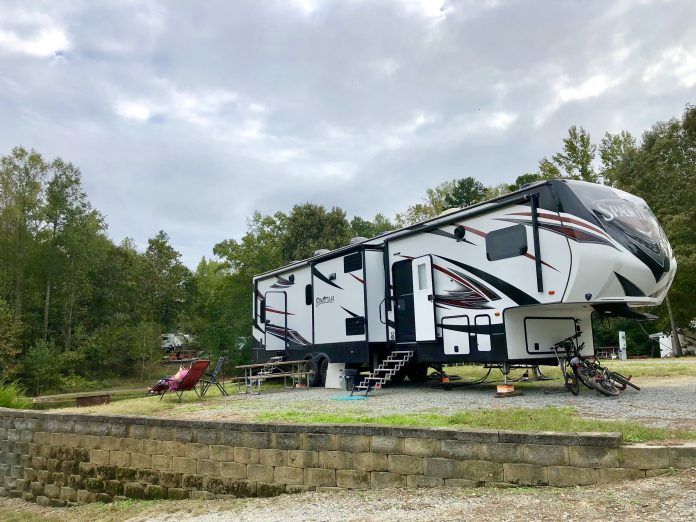
Understanding Camping Etiquette
Campsites have their posted rules, but the unspoken etiquette can indeed be a bit of a mystery to newcomers. Once learned, these unspoken rules help make the camping experience better for everyone.
So what are some specific tips or common faux pas? A lot of new campers often find them incredibly useful. And for those looking to handle tricky situations with neighbors, having some guidance could be a lifesaver.
Let’s dive into the unwritten code of campground conduct that can truly enhance your RVing experience.
Picture this: you’re sipping coffee by the crackling campfire, the serene sounds of nature embracing you. But wait, did you remember to bring your own firewood? Next you hear a snap, as you discover someone is taking a shortcut through YOUR site and back to their RV.
Ah, here’s where the unspoken rules kick in. Sharing campground resources like firewood or lending a helping hand to a neighbor struggling with their tent stakes can foster a sense of community that enriches the camping adventure for all. These small gestures go a long way in creating a harmonious atmosphere among campers.
Often, mastering campground etiquette isn’t just about following the posted rules; it’s about embracing a spirit of camaraderie and respect that elevates everyone’s outdoor experience. We will unveil a few of the secrets of being a good camping neighbor as well as handling those not-so-friendly camping neighbors that remind us that we have wheels on our RV and we should know how & when to use them.
So, let’s forge ahead and unlock the hidden gems of campground decorum together!
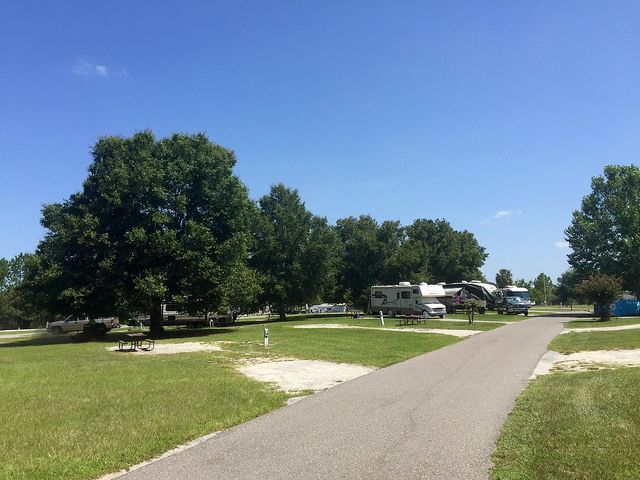
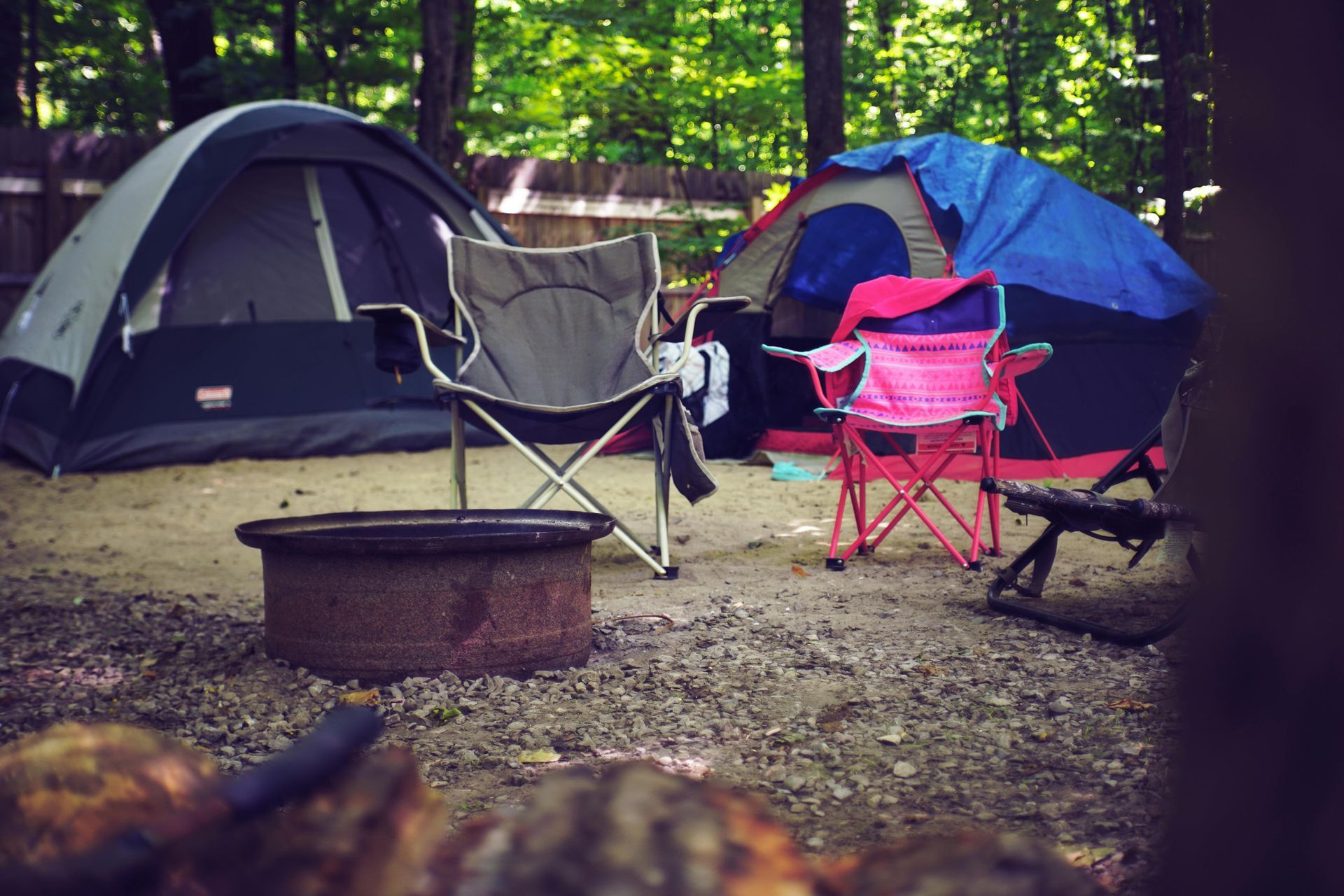
Camping with Respect
Essential Camping Etiquette for RV Enthusiasts
Respect Your Neighbors
Leave No Trace
Be Mindful of Space
Follow Campground Rules
Try Not To Arrive To Late (& noisily set up)
Sometimes the inevitable happens and you arrive late to a campsite. You should always try to arrive close to check-in time and well before quiet hours.
Don’t be that camper that drives up late at night with his (or her) travel companion yelling directions as he backs into the campsite. Nor do you want to be the guy that’s setting up his camp while your neighbors are trying to sleep.
If you have to arrive late, take a moment to call the campground ahead of time and give the campground host an estimated time of arrival. Some campgrounds have strict late check in policies.
When you do arrive at the campground, make sure you don’t have your high beams on, loud music blaring and slowly drive to your spot.
Back in as quietly as you can. If it’s so late that it’s almost early, you can even consider pulling straight in and unhitching the RV in the morning.
Another reason to not establish camp at night is you need to make sure you’re not encroaching on your neighbor’s campsite.
Before you park, be sure to think about where your slide-outs AND YOUR HOSES will end up being.
DON’T BE THE CAMPER whose stinky slinky (that’s an RV term for a sewer hose) encroaches on your neighbor’s outdoor living area. The same unspoken rule goes for your slide-outs hanging over their campsite (even if it’s just a little).
As you set up please make sure bright lights aren’t shining down on your neighbors or through their windows. Light pollution is a thing, even in the woods. Bright lights can not only be intrusive, but they can also be dangerous if they temporarily blind innocent campers or animals. Instead of high-wattage flood lights, invest in dimmable lanterns or subtle LED lighting.
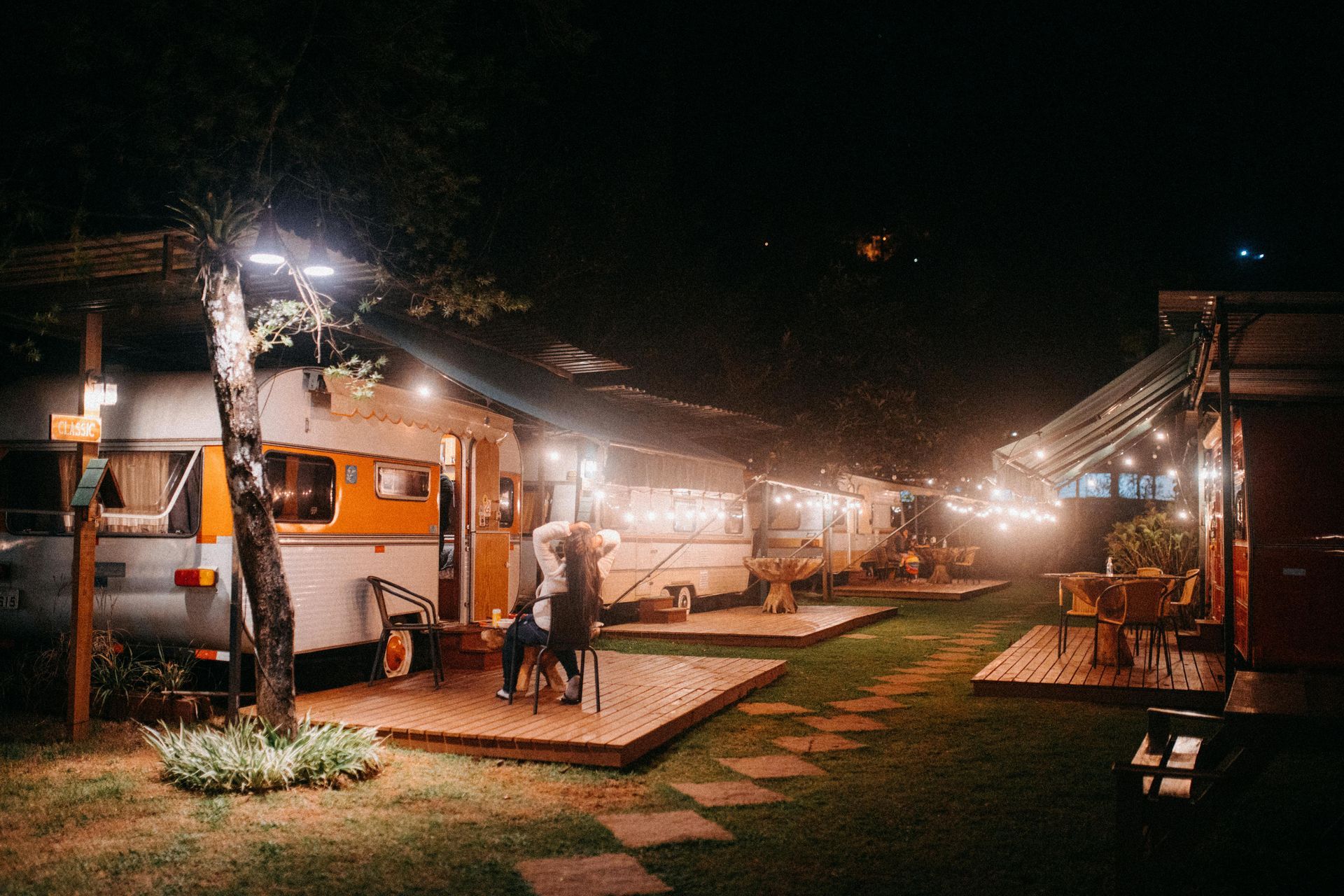
Respect Your Neighbor's Privacy
Not encroaching on your neighbor’s campsite is only one way you need to respect your neighbor’s privacy. You also need to respect their family time, their quiet time, their personal space, and the fact that they may not be the most sociable person.
It’s wonderful to make new friends while you are camping, but your neighbor doesn’t necessarily want to be one of them. Campground etiquette requires you to always be friendly, but not demand friendship in return.
Extroverts especially have to be mindful that sometimes my neighbor just wants a quiet camping trip or to focus on their family. So, do your best to be aware of the social cues that signify they’d prefer to be mostly left alone.
Most of us spend a lot of time in front of screens these days, interacting in texts and on social media more than in person.
Dust off your communication skills at the campground and look for opportunities to be friendly, just like the good ol’ days but try not to be the camper that locks your neighbor in a conversation they can’t escape from
Sometimes people actually camp to get away from the hustle and bustle of their busy life and they are not out there to meet new people or make connections. Be mindful of their personal space.
Why are campground rules important?
What should I do if I see someone breaking the rules?
Are there specific rules for pets?
How can I help protect the environment while camping?
Top Tips for Being Respectful
No Shortcuts
A good shortcut can be tempting, especially if you’re hauling wood or water. But much like you wouldn’t walk through your neighbor’s yard at home without their permission, don’t do it when you’re camping. Usually kids are the biggest offenders here, so make sure you let your kids (or your spouse) know it’s not OK to cut through anyone else’s campsite even if it IS a shorter walk to the pool.
Keep Your Campsite Clean
It is good to always leave your campsite clean during your stay. Take the time to dispose of trash properly and never leave any trash laying around the campsite. This can bring unwanted visitors into the center of camp that may not only be a menace, but a danger to other campers depending on where you are camping.
Campgrounds typically have dumpsters throughout.
Leave Wildlife Wild
At Learn to RV, we believe in leaving wildlife wild! When exploring the great outdoors, avoid interacting with animals, digging up plants, or cutting down live trees for firewood. By being mindful of your campsite and surroundings, you help protect precious habitats and ensure that nature remains vibrant for everyone to enjoy.
Unwritten Quiet Hours
If you don’t see the quiet times or park rules posted, assume it’s 10 pm to 6am. That’s the standard for national parks and state parks, as well as most campgrounds. Another general rule of thumb is to keep your noise levels down from sundown to sunup.
If you happen to be boondocking with a generator, try to park next to other RVs with generators.
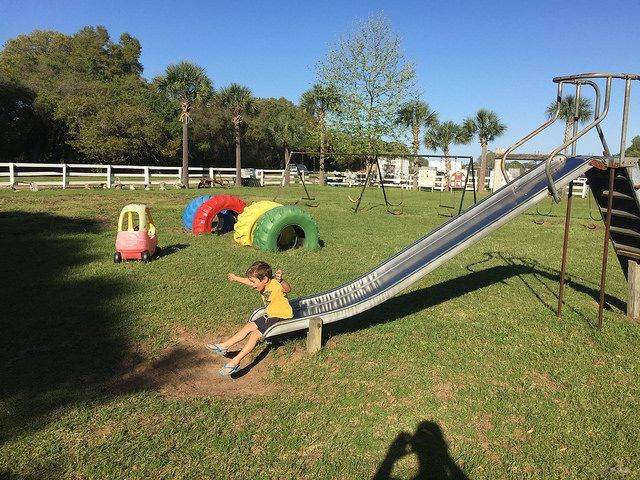
Choose The Right Type of Campground for You!
There are a variety of campground types that cater to specific kinds of people and equipment.
For example, some campgrounds are for RVs only, while others allow a mix of RVs, motorhomes, 5th wheels, travel trailers, pop-up campers and tents.
The right campground for a family or group may not be the right place for older couples seeking a fun place to meet people their own age.
Choosing a campground can depend on the type of equipment you have, the amenities the location offers, but also the experience level of the group, how long they’ll be staying, and how they intend to enjoy the camping experience.
A lone camper or quiet couple might be more comfortable in a small campsite next to a lake, or a dispersed camp in the middle of the forest, but a family might like a full-service family campground with a waterpark and lots to do.
There are many 55+ parks around the country if you are not traveling with children that might be more appealing. They often have crafts and active pickleball events and regular BINGO or Poker nights.
Essential Camping Etiquette Tips
When you're out in nature, it's important to respect the environment and fellow campers. One key tip is to always leave no trace. This means packing out everything you bring in, including trash, leftover food, and any other items. By doing so, you help preserve the beauty of the outdoors for others to enjoy. Remember, a clean campsite is a happy campsite!
Empty The Tanks Discreetly
It’s not anyone’s favorite task, but dumping the black and gray holding tanks is a fact of life for every RV owner and should be done courteously.
If the sewer hookup is close to another camper’s site, be considerate and empty the tanks when they are not relaxing nearby, and particularly not when they are enjoying a meal at the picnic table.
Even if you do everything right, dumping the tanks can emit unpleasant odors.
Consider tackling that chore early in the day or late in the evening when many campers are inside their rigs.
If you are using the campground’s dump station, move quickly when other RVers are waiting in line with their RVs and take care of the black-tank flush at your next stop.
ALWAYS Pick Up After Your Dog
Contrary to what many dog owners think, the “great outdoors” is not your dog’s toilet. Even if you’re “out in the wild” on a hike or walk, you should always clean up after your dog. Yes, you may in the wild, but your dog isn’t a wild animal. Neither are you.
Even if your Golden Retriever wouldn’t hurt a fly, other campers (and their pets) probably don’t know that. That’s why it’s a good idea to keep your pets on a leash when they’re in close proximity to others.
If you want your furry family member to be able to run wild while you’re camping, look for a campground that has a fenced-in dog park or take them on hiking trails that don’t require leashes.
Also, don’t forget to pick up after them. Few things ruin your day faster than stepping in a fresh pile of dog poo. DON’T BE THE CAMPER that lets their furry friend do their business and then leave it for nature to clean up.
NEVER leave a fire unattended
Read: Firewood Conundrum for the TravelerA campsite without a fire is like a night without stars. Still, you should never leave it unattended. It’s also your responsibility to have a means of putting it out. Many camp hosts say their biggest pet peeve is when campers leave the campground without putting out their fire. In fact, even when you think the campfire is out, a few embers may still be warm.
Much like you don’t want to start a wildfire, you probably don’t want to introduce an invasive species either. That’s why you should always buy your firewood locally, and ideally, from the campground where you’re staying.
Engage with Fellow Campers
Camping is a great opportunity to meet new people. Don't hesitate to say hello to your neighbors and share stories or tips. A friendly wave or a simple conversation can enhance your camping experience and foster a sense of community. Just remember to respect their space and privacy as well.
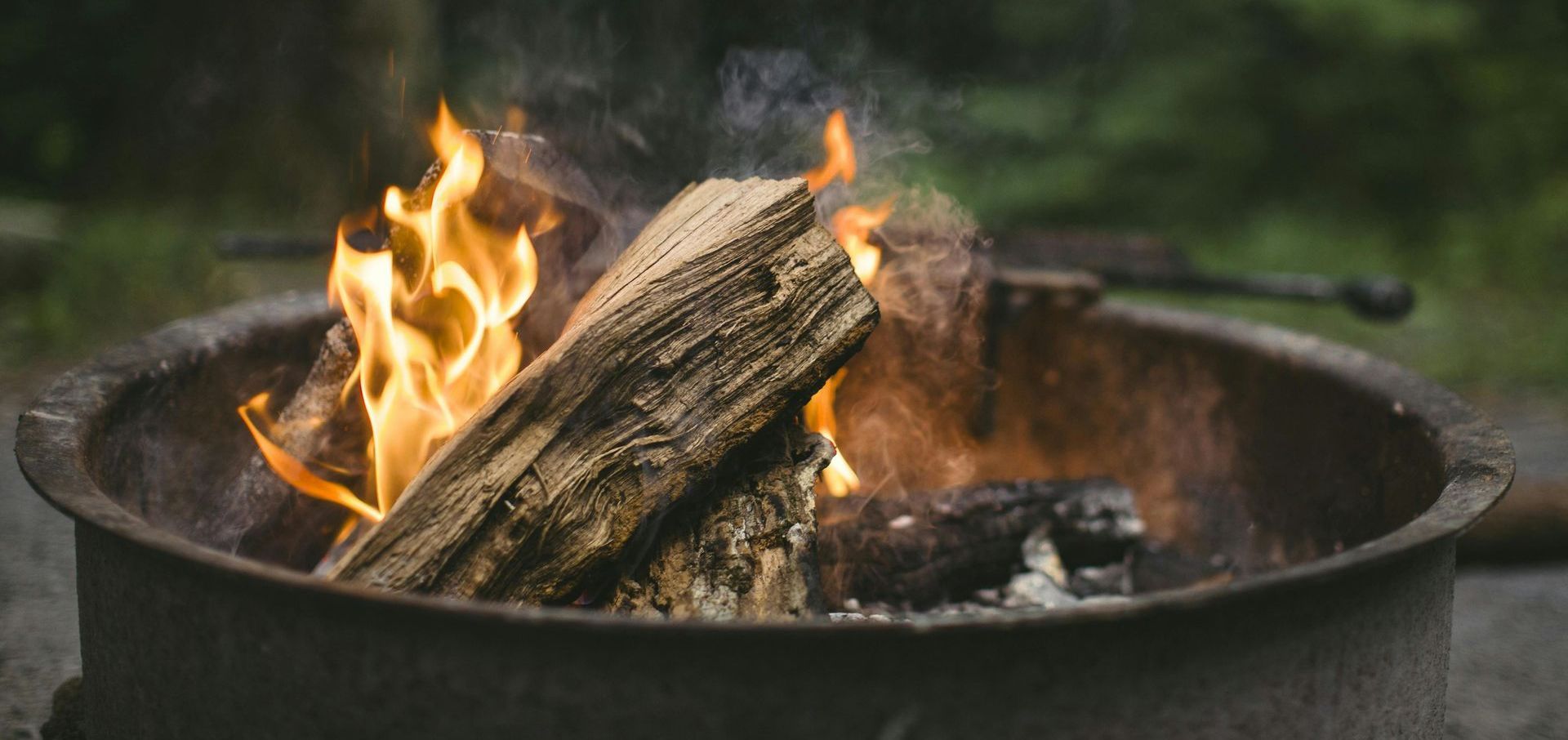
Campfire Etiquette and Safety Rules to Follow
· Always check local restrictions about open fires.
· Be cautious and follow Leave No Trace Principles when foraging for firewood.
· If available, use an existing fire ring. If there is one not available make sure to build one using stones and dirt. Before you leave make sure to break your firepit and place the stones back.
· Always keep your campfire to a small and manageable size.
· Use common sense when creating a campfire.
· Safety first! Make sure to always have a way to quickly extinguish your fire. This can be sand, water, or even a fire extinguisher. A shovel can be handy as well.
· NEVER leave your fire unattended! It doesn’t hurt to ask a camp friend or even your camp neighbor to watch your fire if you have to grab something or run to the bathroom. Also be respectful and don’t just pawn your campfire on to someone else and be gone for long periods of time either.
· Be mindful of the items that you are burning. Some items can release toxic fumes. Keep the items you are burning to natural items such as wood, leaves, and maybe even paper or cardboard.
· Always make sure to completely put your fire out before leaving or going to bed.
As a parent of seven children, I know how kids can be. This is also a hot topic. Children can be loud, play around without thinking twice of where they are running too, and are quick to make friends and want to hang out. The pitter patter of them running up and down inside the camper or slamming a door non-stop may get on your neighbors nerves.
Its okay to let kids be kids but it is also important to teach our kids proper camping etiquette. Some of the things we have taught our kids ( who have grown up traveling) and to also keep in mind when camping with children are:
· Be mindful of your voice & tone. No yelling across the campground or campsite. This is an important lesson for adults too
· No running or playing in other people’s campsites. The only exception is if they are playing with a camping friends that we know and it is okay with the parents.
· No touching, messing, or getting into another campers belongings.
· Always follow the campground quiet time.
· Be courteous to other adults.
· Never pet another dog without permission – this applies to adults as well as children!
· Never play by the water unsupervised.
Proper Etiquette When Camping with Children

RVer Testimonials on Camping Etiquette
Real Experiences, Real Lessons
"Practicing good camping etiquette transformed our RV trips. We made friends and created lasting memories!"
Jessica Thompson
2 weeks ago
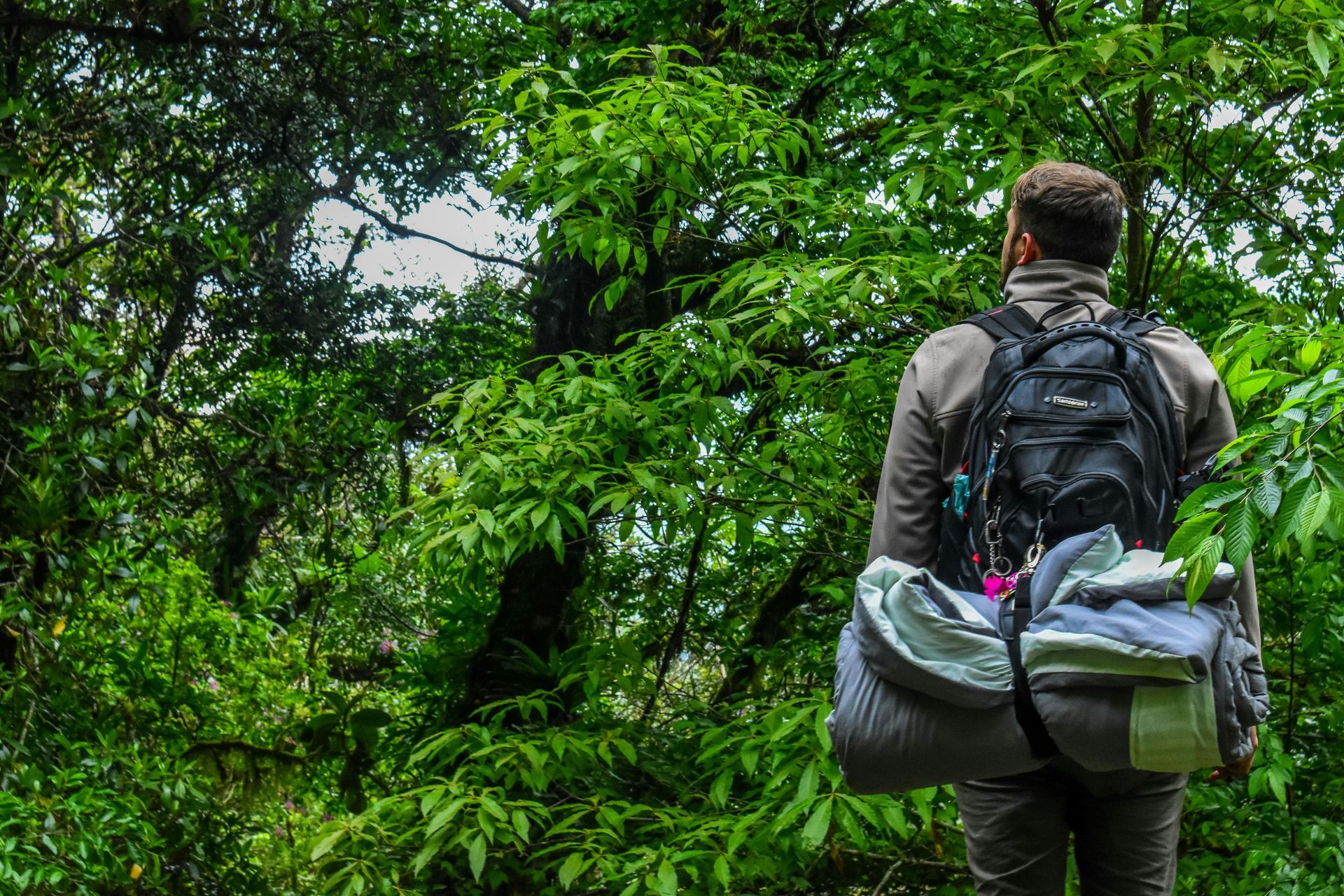
"Respecting quiet hours made our campground experience so much better. Everyone enjoyed their stay!"

Mark Johnson
1 month ago
"I learned the importance of keeping the area clean. It’s a small effort that makes a big difference!"
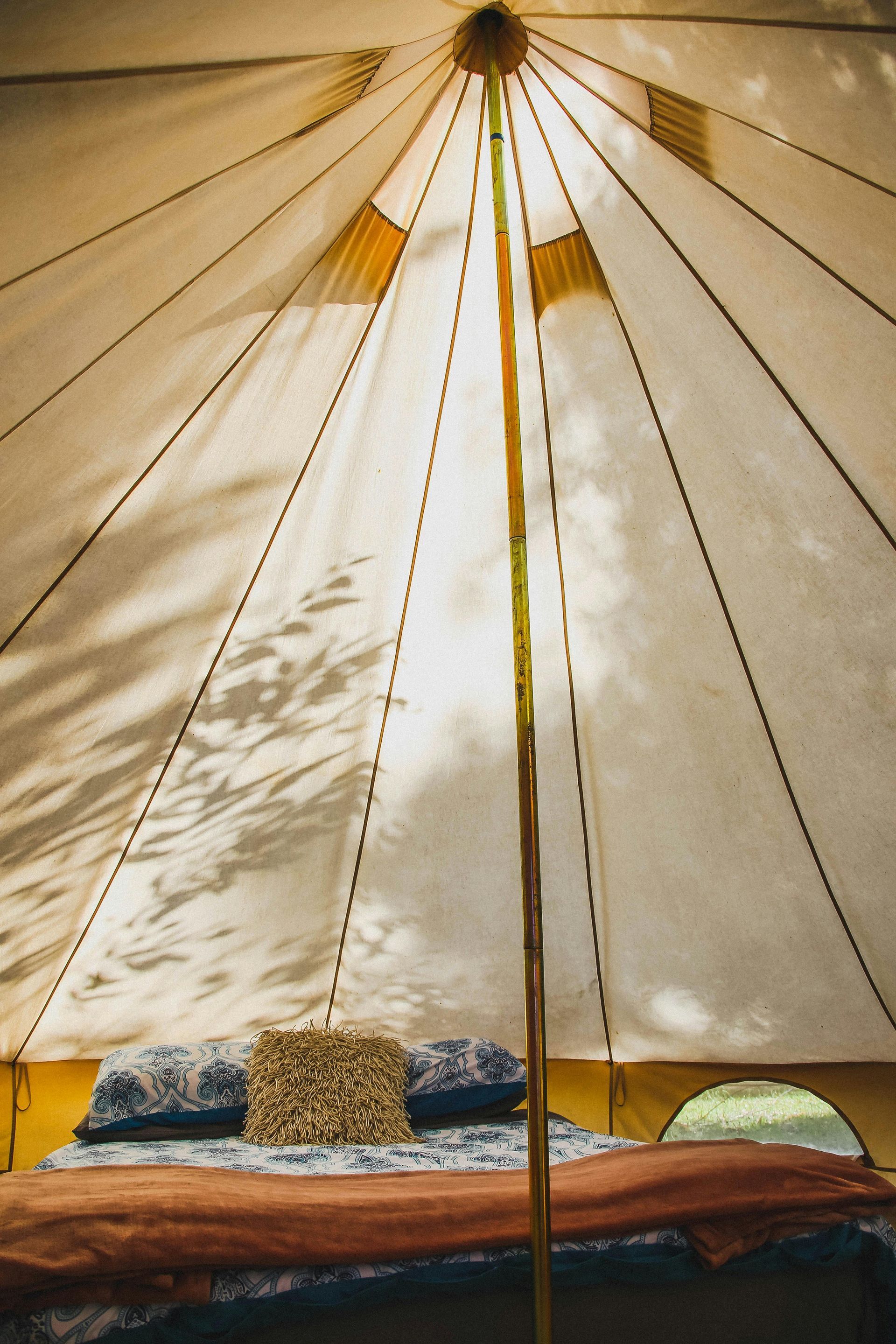
Emily Carter
3 weeks ago
Final Thoughts
While I think all of the things listed above are very important, I think that the most important camping etiquette is RESPECT. I know it’s probably not listed as an actual camp etiquette but I believe that if we follow all the camping etiquettes, it all comes down to showing respect.
This can be respect for the wildlife and the nature around us by following Leave No Trace and proper fire regulations. Respect for other campers by obeying quiet hour, being kind to each other, and by remembering that we are sharing that little part of the Earth with other people. Even respect to the future visitors of the campground by cleaning up after yourself and leaving the area looking better than before you arrived.
We’ll never forget the times when someone lended a helping hand. A knowledgable and kind stranger could save you from a disaster, and we have heard many similar stories over the years.
Passing on expertise is a truly wonderful tradition in RV culture.
On the other hand, let fellow campers focus when parking, hitching and unhitching their RVs. Talking to campers when they are trying to back in a trailer or hitch up to leave is not only distracting, it can be downright dangerous.
Don’t forget to give people their space, even if you think you could help them get into that difficult campsite in a flash. And try not to stare — we were all rookies once.

